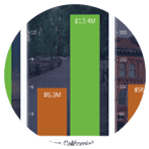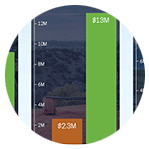Get the Facts on Water System Condemnation

|
Increasingly, anti-private water activists are trying to use eminent domain – also called condemnation – to take over privately-owned, professionally-operated water systems. Groups like Food & Water Watch, Corporate Accountability and Public Water Now mislead communities to try to make the public takeover process sound easy. In reality, the condemnation legal process is long, complicated and expensive and has proven to result in higher costs for residents and communities. |
Even though private utilities are regulated by a state public utility commission (PUC) and have higher Safe Drinking Water Act compliance rates than government-run systems, these activists hold an emotionally-charged ideological view that water systems should only be owned and operated by the government. These activist groups try to recruit others to support condemnation through inaccurate claims and misleading “studies” that ignore important facts and fail to tell the full story. To learn more about condemnation and the negative impact the process has had on communities across the country, check out the many resources below. |
CONDEMNATION IN THE U.S.

LEARN MORE














